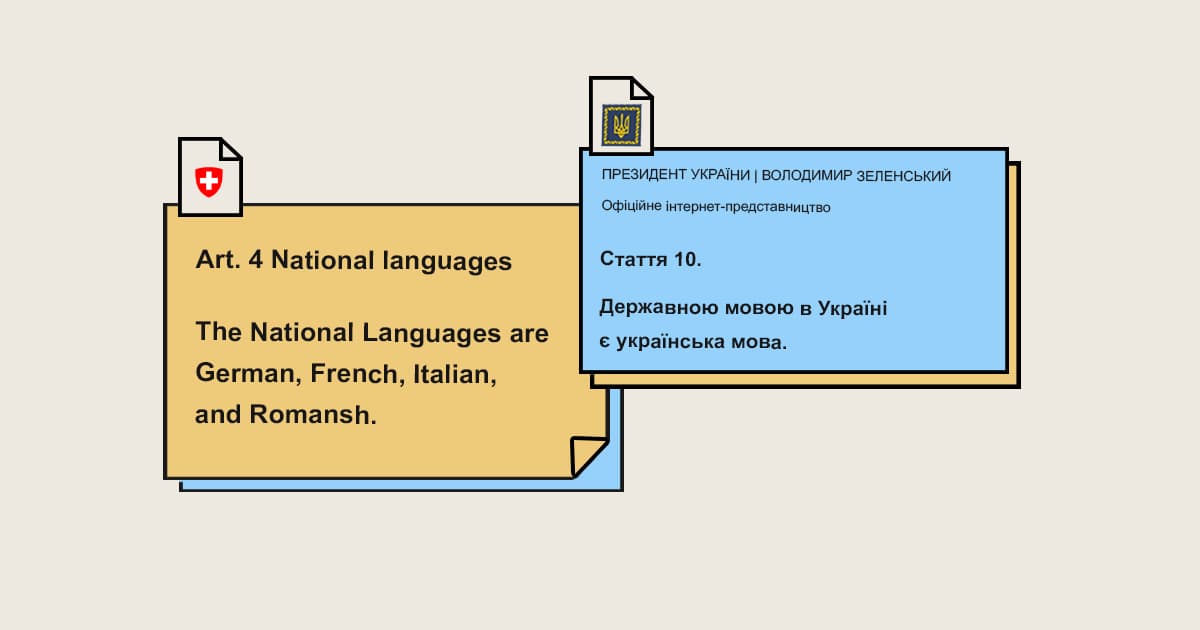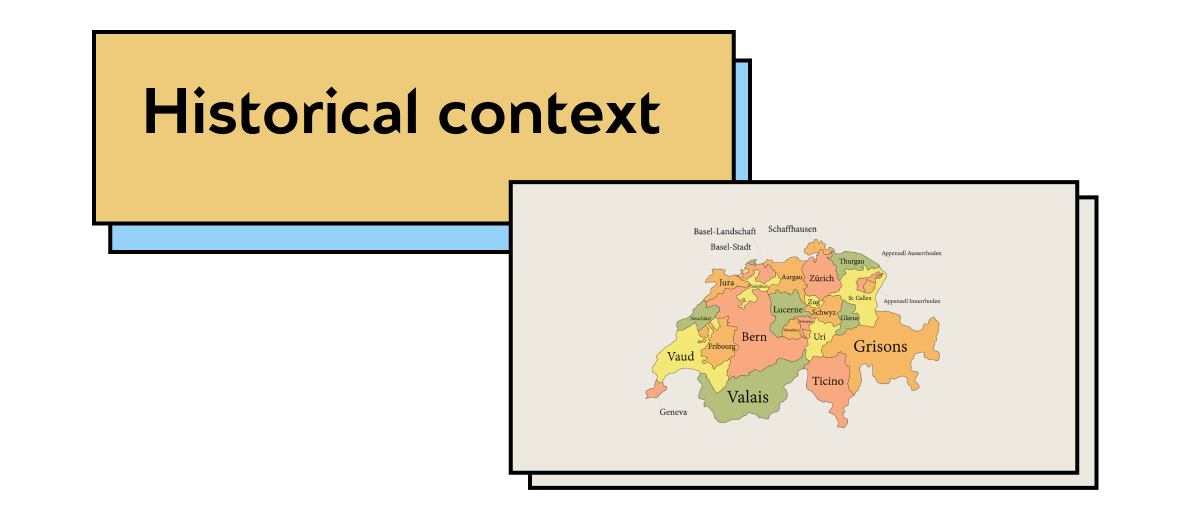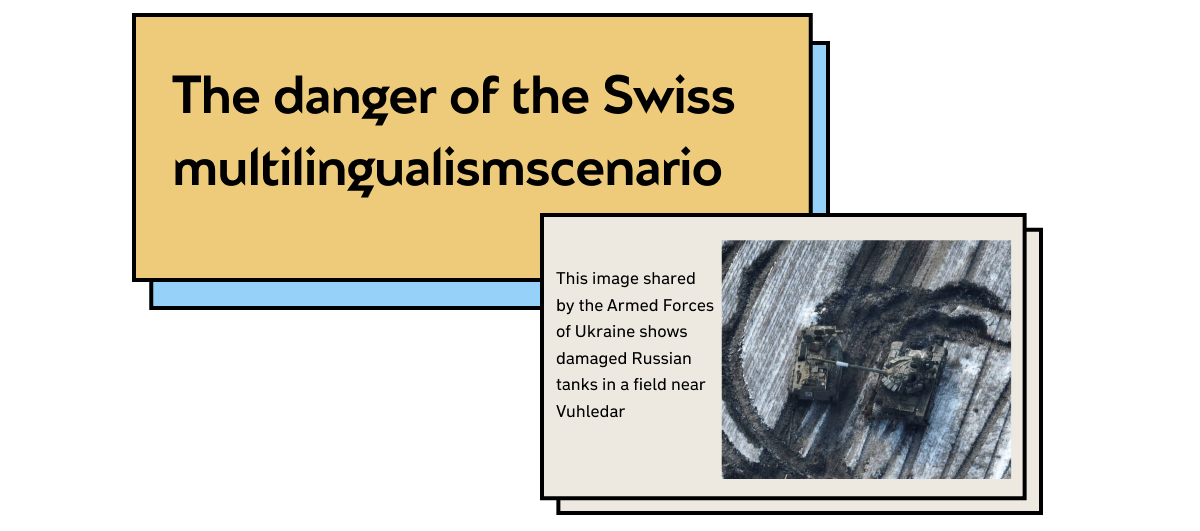The language issue: why can't Ukraine implement the Swiss experience?
Anna Fratsyvir

In the context of the language issue, discussions sometimes arise as to why Ukraine does not follow the Swiss example, where four official languages are recognised at the state level: French, German, Italian, and Romansh.
The problem is that Switzerland and Ukraine have had different historical experiences. Moreover, the Swiss multilingualism scenario is dangerous for Ukraine. Read the article to find out why.

Switzerland is different in terms of state-building. Unlike other European countries, Switzerland is a "Willensnation," or "nation of will," and a union of 26 "cantons," or administrative units of the state. In this sense, Switzerland is a confederation, not a nation, the first key difference from Ukraine.
"Switzerland became a confederation not 5, 10, or 20 years ago, but in the 17th century after the signing of the Peace of Westphalia. Nation-states are the formation of political, not ethnic nations," Ihor Mingazutdinov, PhD in History, told Svidomy.
Throughout history, the cantons were largely independent states with their borders, army, customs, and language. Until the late Middle Ages, the territory of modern Switzerland never constituted a single political or cultural unit. Switzerland is a kind of defensive league on the map of Europe, which formed in a region not dominated by the empires controlling most of the continent at that time. During the 11th and 13th centuries, Switzerland was divided into small feudal possessions. By the middle of the 13th century, the territories of Switzerland were under the rule of the Swabian dukes and their vassals, the Counts of Savoy, and the Habsburg crown.
The imperial influence on the Swiss lands led to political consolidation and the fight against the empire. To this end, in 1291, the cantons of Uri, Schwyz, and Unterwalden entered into a "perpetual defence alliance" that effectively founded modern Switzerland. After the union's victory over the Habsburgs, other cantons began to join them: Lucerne, Zurich, Glarus, Zug, and Bern. Thus, the country became an amalgamation of four different nationalities formed under the influence of neighbouring states.
Switzerland was the only early modern republic to survive the reign of Napoleon I. Unlike all similar confederations, such as the Hanseatic and Swabian Leagues, Switzerland managed to maintain its status despite internal strife.
"It's strange to hear Switzerland and the question of its four languages in discussions. What language should they have, then? The Swiss do not have a titular nation; they could not have had one language from the very beginning. This diversity is due to the formation of a political nation due to historical and socio-economic factors, but not ethnic ones," the expert explains.
The language of each canton is determined by its geographical and cultural proximity to a particular country: Italian is spoken in the south, French in the west; German is common in the central and eastern parts. A fourth language is spoken in the southwest, and it is spoken by only 0.5% of the Swiss population.
On the other hand, Ukraine's development is an entirely different historical experience and scenario. First and foremost, Ukraine was formed as a unitary state with one nation, the Ukrainians, living on its territory. Starting with Kievan Rus, the Zaporizhian Army, the Ukrainian People's Republic, and up to today's Ukraine, Ukrainians have been and are the leading nation on the territories that define Ukraine's borders. The only exception is Crimea, where the majority of the ethnic population made up of Crimean Tatars, Kyrymlys and Krymchaks.
Unlike Switzerland, Ukraine does not have administrative units distinguished by ethnicity. The prevalence of the Russian language in certain regions is a consequence of the aggressive policy of the Russian Empire, which eradicated the Ukrainian language. In particular, such manifestations are the Valuev Circular of 1863 and the Emskyi Ukaz (Decree) of 1876. The destruction of the Ukrainian language continued during the Soviet era when Ukrainian schools were closed, and career prospects were limited to those who spoke Russian.

The contemporary realities of Switzerland and Ukraine also differ. First and foremost, there are differences in the countries' government systems. Switzerland is a federal parliamentary republic (the parliament is the main body, and the president has a symbolic role), while Ukraine is a unitary parliamentary-presidential republic.
The concept of state structure is one of the key ones, as it determines language policy to a certain extent. Each of the 26 cantons of Switzerland, according to Article 3 of the federal constitution, is sovereign to the extent that this document does not limit its sovereignty. However, cantons are essentially states with certain limitations, and each has its own political power within its territory.
In the context of language policy, it should be noted that each canton has only one official language spoken by the majority of the population. If a person wants to become a citizen in a French-speaking canton, they must pass a French exam; in a German-speaking canton, it is a German exam. There are clearly defined regions for all four official languages.
Instead, Ukraine's language policy is based on the principle of unity. The absolute majority of Ukraine's population is Ukrainian, so it is more appropriate to compare Ukraine in the language context with Poland or France, whose state system is also unitary.
"Why do we forget France in this context? They have a single official language, French. They are, by the way, also a political nation, but they have one language," says the PhD in History.

One of the biggest dangers of introducing several state languages in Ukraine is Russia's aggressive imperial policy. Neighboring France, Germany, and Italy do not claim their rights to Swiss cantons because people there speak these languages. Instead, Russia uses Russian as a gentle force followed by tanks. For Russia, language is a means of aggression primarily because it is through language that it can spread its culture and propaganda.
Another important aspect is that language is essential in creating a nation and statehood for Ukraine.
"The Ukrainian political nation is built on ethnicity, and the language factor is an integral part of ethnicity," the expert says.


